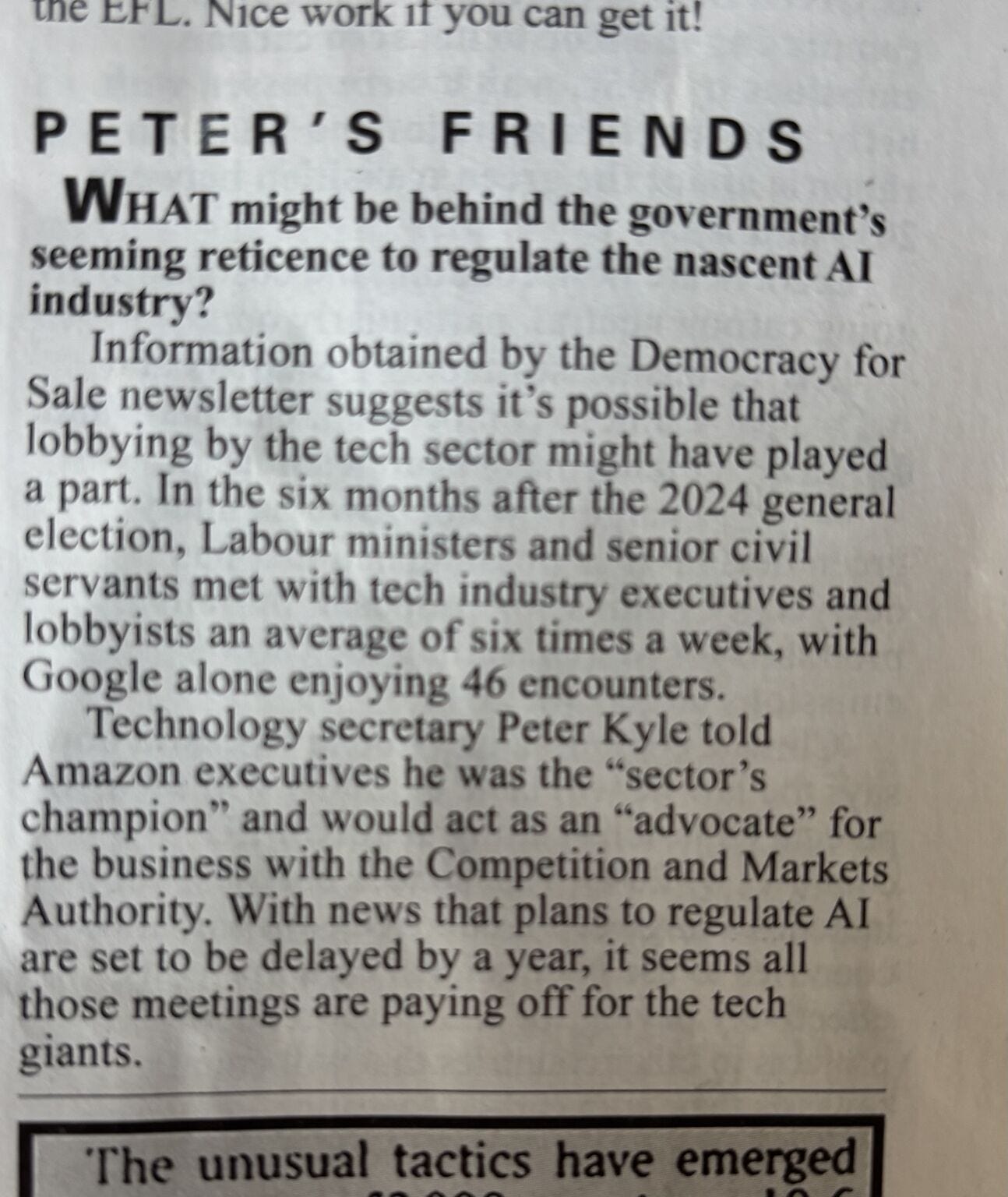Last week, I was delighted to be joined by journalist and author
to discuss his new book Lost Boys. It’s a fascinating investigation into the rise of manosphere - and how the crisis facing young men is being exploited by the far right.In our conversation - which you can watch in full above - we talked about everything from the role of social media and algorithms in online radicalisation to incels, influencers, and white nationalism, and what the liberals and progressives often get wrong about modern masculinity.
With so many young men voting for Trump, and signs that they could do the same for Reform, understanding the manosphere has never been more important.
Democracy for Sale now has its own YouTube channel - sign up here to follow it. Let me know who you’d like to see interviewed on Democracy for Sale by replying to this email with guest suggestions.
As political falls from grace go, Owen Paterson’s was particularly dramatic.
Back in 2021 the former Conservative environment secretary was found guilty of an “egregious” breach of parliament’s rules after lobbying ministers and regulators on behalf of two companies he was paid hundreds of thousands of pounds to advise.
Paterson resigned his seat rather than face a 30-day suspension from the Commons, although only after Boris Johnson tried - and failed - to nobble the standards watchdog to save him.
You might think that given this public downfall, Mr Paterson would be leery of getting involved in debates about MPs being paid as ‘external consultants’ - but you’d be wrong.
Westminster’s committee on standards is currently holding an inquiry into whether there should be changes to the rules relating to parliamentarians outside interests - and Democracy for Sale was surprised to see that Paterson was among those who have submitted written evidence.
It's fair to say Paterson feels he has done nothing wrong - and there’s no problem with MPs being lobbyists, too.
Paterson’s submission - which runs to more than 2,700 words - ends with an impassioned plea that “the United Kingdom would be less well-governed and the public would not benefit” if second jobs were banned.
Well, it’s a take.
Others disagree. Rose Whiffen from Transparency International UK told us that "external consultancies don't enrich parliamentary debate - they instead create conflicts of interest that can leave MPs vulnerable to rule-breaking behaviour.”
Whiffen added that: “The government should limit second jobs for MPs - voters expect their representatives to focus on serving constituents and the national interest, not juggling outside commercial obligations that compromise their independence."
We’ll be watching the outcome of the standards’ inquiry with interest….
Speaking of lobbying in Parliament, we’ve another story for you….
The lobbyist, the Lord and problem of Britain’s “political influence bazaar”
Prem Sikka has been one of Parliament’s most outspoken critics of Fujitsu’s role in the Post Office scandal. The Labour peer has tabled parliamentary questions, spoken in debates, and published articles condemning the decision to continue awarding lucrative public contracts to the tech giant.
So when Sikka received an email in late May titled “Parliamentary Intervention Needed on Fujitsu’s Government Contracts”, he assumed it was from a campaigner or concerned member of the public.
It wasn’t.
The email came from a Conservative-linked lobbying firm. And the lobbyist was asking Sikka to raise concerns in Parliament about Fujitsu—on behalf of a client.
“I couldn’t believe it,” Sikka told Democracy for Sale. “A lobbying firm shouldn’t be asking legislators to intervene on their behalf. It’s totally wrong.”
The e-mail was sent by Sameer Gulati, a former advisor at the Department for International Trade and now associate director at NorthPoint Strategy, a lobbying firm founded in 2023 by Tory peer and ex-MP James Wharton.
Gulati’s email didn’t identify NorthPoint’s client. It simply stated that the firm was “representing stakeholders concerned by both the [Post Office] scandal and Fujitsu's expanding role in public service provision,” and said Sikka’s “parliamentary influence is crucial in maintaining a spotlight on this issue.”
The email—reproduced below—asked Sikka to consider various interventions, including “tabling parliamentary questions about Fujitsu’s suitability for any government contracts.” There was no mention, or suggestion, of payment.
Earlier this week, Sikka wrote to the Lords Speaker, drawing attention to the email. “I am very concerned that commercial interests can subvert peers so nakedly and damage the standing of the House,” he wrote to Lord McFall.
NorthPoint Strategy’s client list includes aviation and energy companies, as well as a crypto lobbying group, the UK Cryptoasset Business Council.
The firm was criticised earlier this year after hiring Lord Callanan, a Conservative peer who now acts as NorthPoint’s general counsel. Callanan, who previously served as an energy minister under Rishi Sunak, received clearance from the Acoba watchdog to take the job, which involves providing “strategic advice” on political risks.
Responding to Sikka’s complaint, NorthPoint’s managing director, former Tory aide Simon Jennings, said the peer had “either fundamentally misunderstood or deliberately misrepresented the nature of the communication.”
“As is entirely standard practice in public affairs, we invited him to consider supporting activity aligned with those views,” Jennings told Democracy for Sale.
Two days after receiving Sikka’s letter, the Lord's Speaker replied. There would be no investigation.
“Should a Member choose to pursue a cause having discussed it with a lobbyist, this would not in itself constitute a breach of the Code, so long as no payment or reward of any other kind has been accepted or agreed,” McFall’s private secretary wrote.
Sikka said the whole episode highlighted the need to ban peers from working as lobbyists. While MPs are barred from taking paid lobbying roles under legislation introduced by Labour last year, members of the House of Lords can be paid to offer political advice.
“No legislator should be able to act as a hired gun for any interest,” Sikka said. “Until you end this political influence bazaar, we’re never going to restore people’s faith in politics.”
Finally: earlier this month, we reported on a pretty unprecedented blizzard of meetings between the Labour government and big tech giants. Tech secretary Peter Kyle even told Amazon that he would “advocate” for them at the competition watchdog.
We found 161 recording meetings between tech representatives and government officials during Labour’s first six months in office. (On average, business and commercial stakeholders have *23 times* as many meetings with ministers as charity, consumer and public interest groups, according to our friends at Spotlight on Corruption.)
Our story was covered in the latest issue of Private Eye.
Not included in our story was a meeting in April between Kyle Sam Altman, the boss of OpenAI. What did the secretary of state and the CEO discuss over their £30 lunch?
We don’t know - when Democracy for Sale contributor
sent a Freedom of Information asking minutes, notes and other documents from the meeting he was told nothing existed. There was no written record of a meeting between a senior minister and one of the world’s most influential tech bros.This is exactly the reason that Democracy for Sale is so committed to fighting against government secrecy. If you don’t already, please become a paid subscriber to support our work.












Share this post